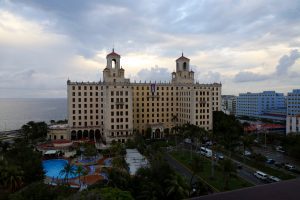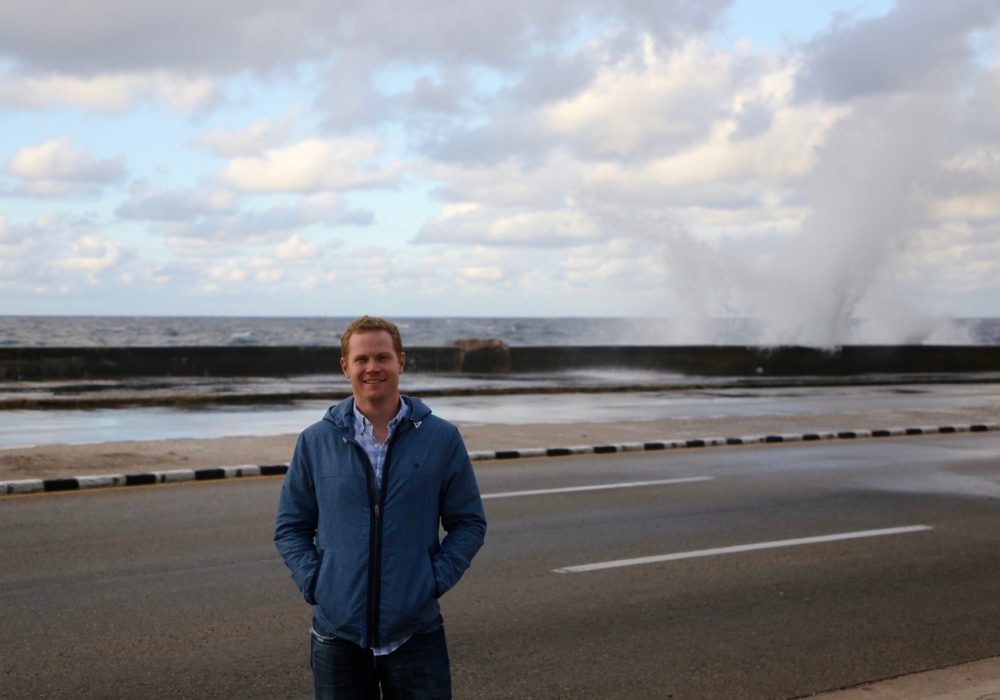Kyle Collins (Class of 2018) recently participated in the Darden Worldwide Course to Cuba, led by Darden finance professor Marc Lipson. The course focused on an economy in transition and was designed to provide students with a deeper understanding of Cuba’s history, business context, and insights into the economic and social transition currently taking place. For Kyle, the course also unlocked family history and personal perspectives. In his own words:
In early January 1961, the United States severed diplomatic relations with the Castro government in Cuba. A few weeks later, on January 16, 1961, my maternal grandparents fled their hometown in Cuba with their three-year-old daughter (my mother) and their one-year-old son. They thought that they would be back home soon to reunite with their family and friends. They wouldn’t be gone long, just until things blew over, six months, nine months at most.
Fifty-seven years later, neither my grandparents nor my mother have returned to the island. Throughout my childhood, I heard the constant mantra that our family would not return to Cuba until the Communist government was no longer in power, lest we support the very same political machine that had taken everything from our family so many years ago; however, when I first heard about the Darden Worldwide Course in Cuba, I asked my grandparents how they would feel about me joining the trip. Their response surprised me: with a wistful look in their eyes, they encouraged me to make the course, to learn more about the homeland that they left behind, and most importantly, to share their story with my classmates.
In early January, I found myself boarding a flight to Havana, filled with an unsettling mix of excitement and trepidation. Ten days later, I returned to my own hometown in Vero Beach, FL, to reunite with my family, to share my experiences, and to convey some of the complex ways in which my grandparents’ Cuba has evolved. It would take volumes to tell the whole tale, but below are three themes from my time in Cuba that have remained on my mind.
La Lucha: The Cuban Hustle
For the 80% of the Cuban working population that is employed by the government, the official average monthly wage is between $25 and $30; however, recent studies have found that the average Cuban subsists on closer to $100 per month. How then does the average state worker make up for the remaining 75% of his or her monthly income in order to survive?
While remittances from family members abroad certainly play a part, the full answer lies in what Cubans call la lucha. While an appropriate translation would be “the struggle” or “the fight,” in Cuban slang la lucha is closer to a “side hustle,” the extra work that brings in supplemental income each month and that can range from the ingenious to the illicit.
During my time in Cuba I heard of state workers who, when given 10 bags of cement to build a concrete wall, will work carefully to use only eight bags, selling the remaining two on the black market, where they fetch a high price due to scarcity. I met teens who stand in the long lines outside of state-run telecom stores to buy one-hour Wi-Fi cards for $1 each, then sell those cards to tourists who gladly pay $3 per card to avoid the queues. I chatted with a cigar roller who decides whether to smoke or sell the four cigars he is given each day based on the state of his personal finances.
La lucha is a shared national concept, one that was familiar to every Cuban that I met, and while each story was different, all shared the common thread of deeply resourceful and inventive people who have learned to make do with less.
Mobility Through Entrepreneurship (For Some)
Since 2010, Cubans have been permitted to engage in a small number of private business opportunities. These cuentapropistas (self-employed workers) have opened thousands of paladares (private restaurants) and casas particulares (private bed and breakfasts) and ferry countless tourists around the country as private taxi drivers. These businesses have exploded in popularity and now represent 20% of the population and 15% of Cuban GDP.
It’s difficult to overstate the profound impact that private businesses have had on the lives of everyday Cubans. Consider my AirBnb hosts in Trinidad: over the past three years Ruben and Liliana have expanded their casa particular from two guest rooms to seven, reinvesting the proceeds from the business to rebuild their family home, which had fallen into neglect due to the prohibitive cost of building materials. Wealth creation was occurring before my very eyes, wealth that will be passed on to their young son, Rubencito. This may seem commonplace in the United States, but in Cuba such rapid transformation is unprecedented.
As part of the Darden Worldwide Course programming, we also had the privilege of meeting a family of artists, who recently moved from the outskirts of Havana to a beautiful apartment overlooking the iconic Hotel Nacionál. Their move was made possible only through their newfound abilities to sell their artwork freely and to open their home to visitors as a gallery and event space.
Make no mistake, these market reforms have led to true social mobility, yet sadly such upward mobility is still available only to a lucky few. Today’s growing middle class include only those with homes that are large enough to rent rooms or open a private restaurant, those with family cars that can be driven as taxis, and those with artistic talents or other unique skills, but the millions of Cubans without access to the tourism economy continue to struggle to provide for their families and to live with the dignity that they deserve.
Changing Demographics, Changing Minds
During my time in Cuba I spoke with Cubans from across the demographic and socioeconomic spectrum, from retired professionals to young people dancing salsa in the moonlight. Through these conversations I learned the importance of age in shaping views of the world as seen through the lenses of major events in Cuban history. Based on my experience, Cubans today can be loosely categorized into three distinct groups.
The oldest Cubans today were born well before the Revolution. These Cubans, who are in their 70s and 80s today, have distinct memories of life before Fidel Castro seized power and can therefore only view life since in a relative fashion. Those who believe that life got worse following the Revolution remain deeply (if quietly) opposed to the Communist system of government. Those who feel that life improved will remain Castro loyalists until their last day.
The Cuban equivalents of the “Baby Boomers” are those who were born in the early days of the Revolution. These Cubans have only known a president with the last name Castro, and in my conversations with them, I found them to be marked by a deep political apathy. This generation has learned how to survive and provide for their families, and politics for them is a distant game played by men in Havana. They’d prefer to be left alone to work hard and enjoy their time with their families.
 In contrast, my peer generation of Cubans was born at the start of the disastrous economic crash that followed the collapse of the Soviet Union. These Cubans came of age during the so-called “Special Period” and knew a great deal of hardship in their youth. Furthermore, the loosening of information restrictions in recent years means that young people in Cuba have grown up with the Internet and seem to know more about American music and television than I do. I was surprised at the degree to which these Cubans spoke openly of the need for economic reform, for an opening of the economy to allow more private business, and for greater ties with the rest of the world.
In contrast, my peer generation of Cubans was born at the start of the disastrous economic crash that followed the collapse of the Soviet Union. These Cubans came of age during the so-called “Special Period” and knew a great deal of hardship in their youth. Furthermore, the loosening of information restrictions in recent years means that young people in Cuba have grown up with the Internet and seem to know more about American music and television than I do. I was surprised at the degree to which these Cubans spoke openly of the need for economic reform, for an opening of the economy to allow more private business, and for greater ties with the rest of the world.
Our tour guide in Havana was a vibrant, deeply knowledgeable, and engaging young Cuban woman who happened to be the same age as me, and throughout the week I kept considering how lucky the Darden community would be to have her (and others like her) as a classmate and fellow student leader; however, she is committed to her country, to striving to make it a better place for future generations.
The young people that I met in Cuba gave me something that has often been elusive during the 57 years since my family fled Cuba: hope. Hope that positive change will soon come to the island. Hope that all Cubans will one day speak freely and flourish through the ingenuity, hard work, and compassion that were the hallmarks of every Cuban that I met. Hope that my grandparents’ homeland will once again thrive in a distinctly Cuban way by embracing the island’s rich and diverse cultural heritage, maintaining deep love for family and friends, and celebrating the boundless joy for life that permeates every inch of Cuba.

